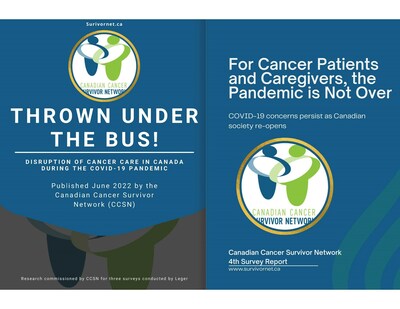For Many Canadians, Cancer Didn't Wait. Now They're Paying the Price
New data from Statistics Canada estimates a 12.3 per cent drop in new cancer case diagnosis in 2020.
Screening and early detection remain the gold standards to create better outcomes for cancer patients.
OTTAWA, ON, June 7, 2023 /CNW/ - Statistics Canada (StatCan) data released last month shows that in 2020, the first year of the global pandemic, there was an estimated 12.3 per cent drop over the previous five-year period in new cancer case diagnoses.
"Since the early days of the pandemic, we've been saying that #cancercantwait," states Jackie Manthorne, President, and CEO of the Canadian Cancer Survivor Network (CCSN). "During prolonged lock-down periods we knew many Canadians would be at risk and some would be denied access to timely diagnosis and treatment."
On May 16th, StatCan released a Cancer incidence in Canada 20201 report that quantified CCSN's concern: 140,330 new cancer cases were diagnosed in 2020, the first year of the COVID-19 pandemic. The number of new cancer cases represents a 12.3 per cent drop in case numbers over the previous five-year period (2015-2019). Overall cancer diagnoses among the male population (-13.2%) declined more than those affecting the female population (-11.4%). The observed incidence rates of the four most commonly diagnoses cancer types – breast, lung and bronchus, prostate, and colorectal cancers – were all lower than expected. Similar data has recently been reported in the United States National Cancer Database.2
"In any other circumstance, this new data would be welcomed and celebrated by the cancer advocacy community," declares Manthorne. "Many cancers are treatable, but only when Canadians have the tools and the means to discover the disease quickly. The Canadian healthcare system, when harnessed properly with current techniques, drugs, and therapies, can turn cancer from a fatal disease to something chronic and more manageable."
StatCan listed three key potential reasons behind this change in fewer cancer cases being diagnosed in 2020. Screening service disruptions, difficulties accessing primary care services, and fewer in-person appointments due to lockdowns and travel restrictions, all may have impacted the registration of new cancer cases in the Canadian population1.
"Importantly, the StatCan data aligns to the results and conclusions drawn from the four CCSN Leger #cancercantwait surveys we conducted between 2020 and 2022," adds Manthorne. "All four surveys focused on the disruption of cancer care in Canada due to COVID-19."
Recent media reports further describe physicians from across the country diagnosing patients with more advanced stages of cancer and other diseases since the pandemic began. "As a result, many Canadians are being given a late cancer diagnosis and, sadly, this will result in more individuals dying of cancer, all because we were too cautious during the pandemic. Sadly, there will be fewer survivors," concludes Manthorne.
The CCSN summarizes that the recent StatsCan data together with various physician comments provided from across Canada demonstrates a failure by the Canadian healthcare system to provide for its citizens. Specifically, the Canadian healthcare system was unable to:
- provide physicians and nurses with the necessary means required to do their jobs;
- keep Canadian cancer screening programs open, which resulted in late diagnoses;
- meet the challenges the healthcare system was required to address; and
- ensure hospitals were better organized, particularly during the early days of the pandemic.
"Some Canadian patients believe that they have been thrown under the bus," concludes Manthorne. "The frustrating part is that the CCSN knew it didn't have to be this way. Instead, we knew #cancercantwait and now we are paying the price."
To read more about the four #cancercantwait CCSN - Leger surveys or our latest reports on cancer care and COVID-19, click here.
Statistics Canada (Statcan) is Canada's national agency that produces statistics to help better understand Canada, its population, resources, economy, society, and culture. For more information on the May 16, 2023 The Daily Report "Cancer incidence in Canada, 2020" please click here.
CCSN works to connect patients, survivors and other stakeholder groups with decision makers and the wider community to engage in discussion and to act on evidence-based best practices to alleviate the medical, emotional, financial, and social costs of cancer. To learn more, visit www.survivornet.ca.
_________________________________ |
1 Statistics Canada, The Daily 2023-05-16, Cancer incidence in Canada, 2020. https://www150.statcan.gc.ca/n1/daily-quotidien/230516/dq230516c-eng.htm |
2 Lum SS, Browner AE, Palis B, et al. Disruption of National Cancer Database Data Models in the First Year of the COVID-19 Pandemic. JAMA Surg. Published online April 12, 2023. doi:10.1001/jamasurg.2023.0652 l |
SOURCE Canadian Cancer Survivor Network (CCSN)


Upcoming Life Sciences Events
- April 2024
- Singapore: Asia Bio Partnering Forum
- London: LSX World Congress
- May 2024
- Seoul: BIO KOREA 2024
 Biotechgate Global Database ›
Biotechgate Global Database ›










